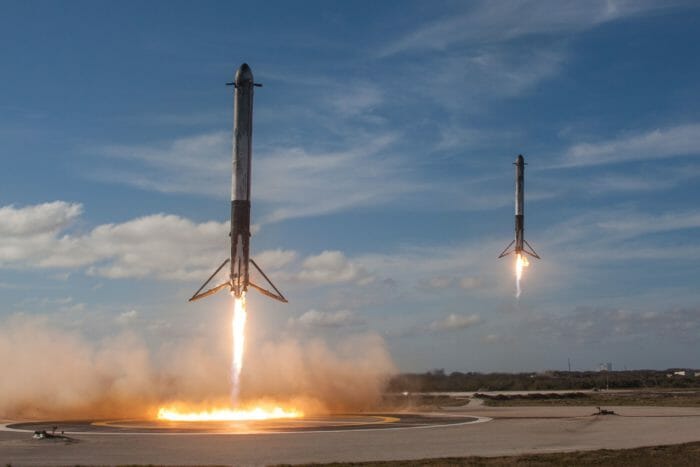Two of the Falcon Heavy’s side boosters successfully land. (Unsplash, CC0)
The Space Exploration Technologies Corporation, more commonly known as SpaceX, has made it publicly known that allowing humans to live in an interplanetary fashion—along with making space travel more efficient—is its main goal. As of late, the company has experienced an unprecedented amount of growth with its projects spanning back to last June.
Part of SpaceX’s most recent progress towards increased efficiency was built around the idea of reusing rockets in order to remove the costs of reconstructing the spacecraft. Both the Falcon 9 and the Dragon have been adapted so that they could be landed on drone ships and recovered. Since the first Falcon 9 launch in June of 2010, the corporation has launched more than fifty of the reusable rockets to carry cargo.
A derivative of the Falcon 9, named the Falcon Heavy, consists of three Falcon 9’s strapped to the side of a center core. The organization completed its first test of the rocket in early February, launching CEO Elon Musk’s red Tesla Roadster into space and recovering two of the three Falcon 9’s on the side for reuse in the process.
Developing substantially cheaper and more powerful rockets that can be reused has laid down aspiring plans for increased satellite use. May 22 was the organization’s last launch, which sent a total of seven satellites, two five Iridium NEXT satellites and two GRACE-FO satellite, into orbit. These launches have also crossed national boundaries, as India, South Korea, and Bulgaria have all launched satellites through SpaceX in the past year.
Companies like SpaceX, Orbital Sciences Corporation, and XCOR Aerospace have all turned space exploration into a commercial service that, with SpaceX’s efforts to make space travel much cheaper, are being purchased by governments around the globe. Despite how monumental SpaceX’s steps forwards have been, however, there is still lots of work to be done before it can be purchased by smaller corporations like schools.








